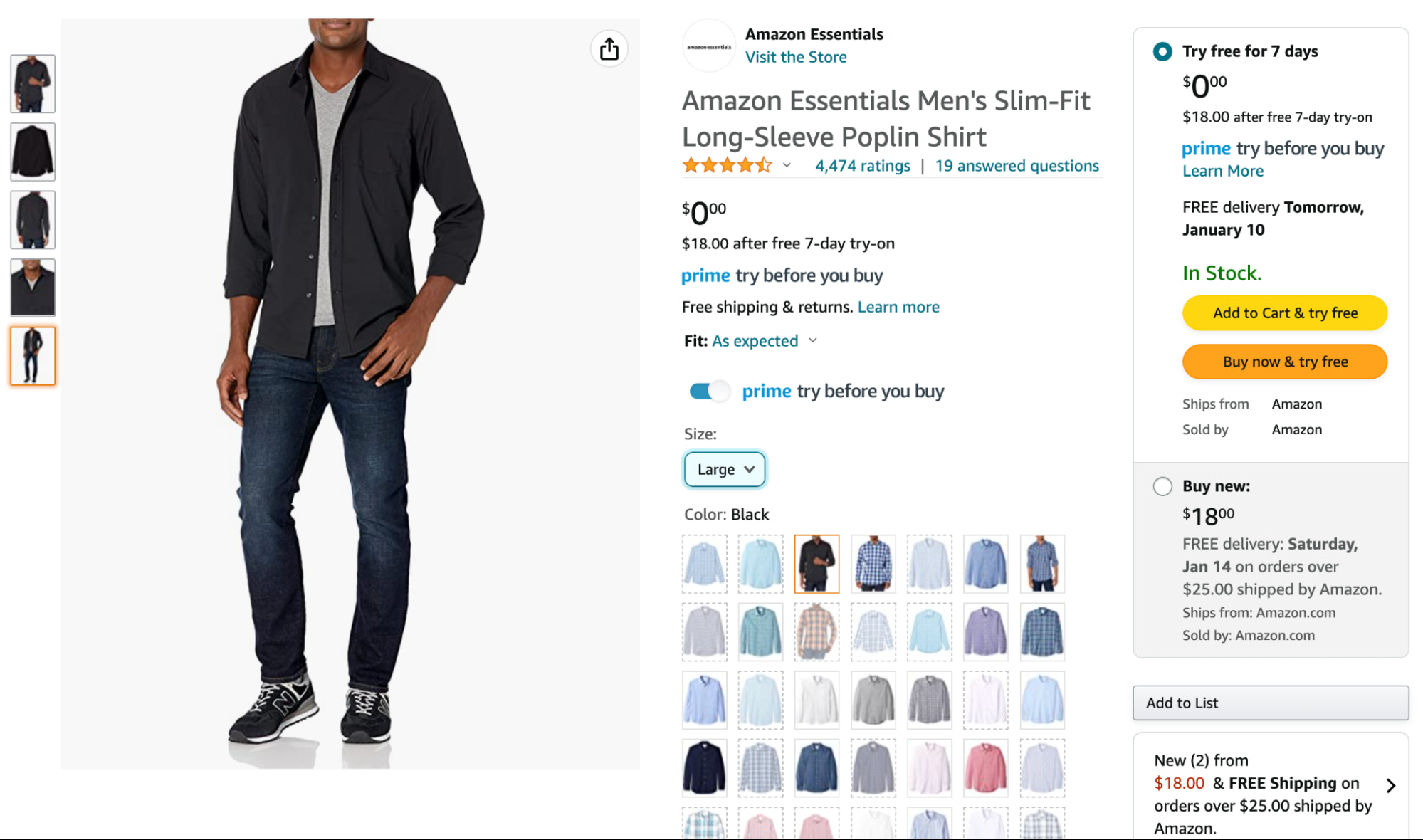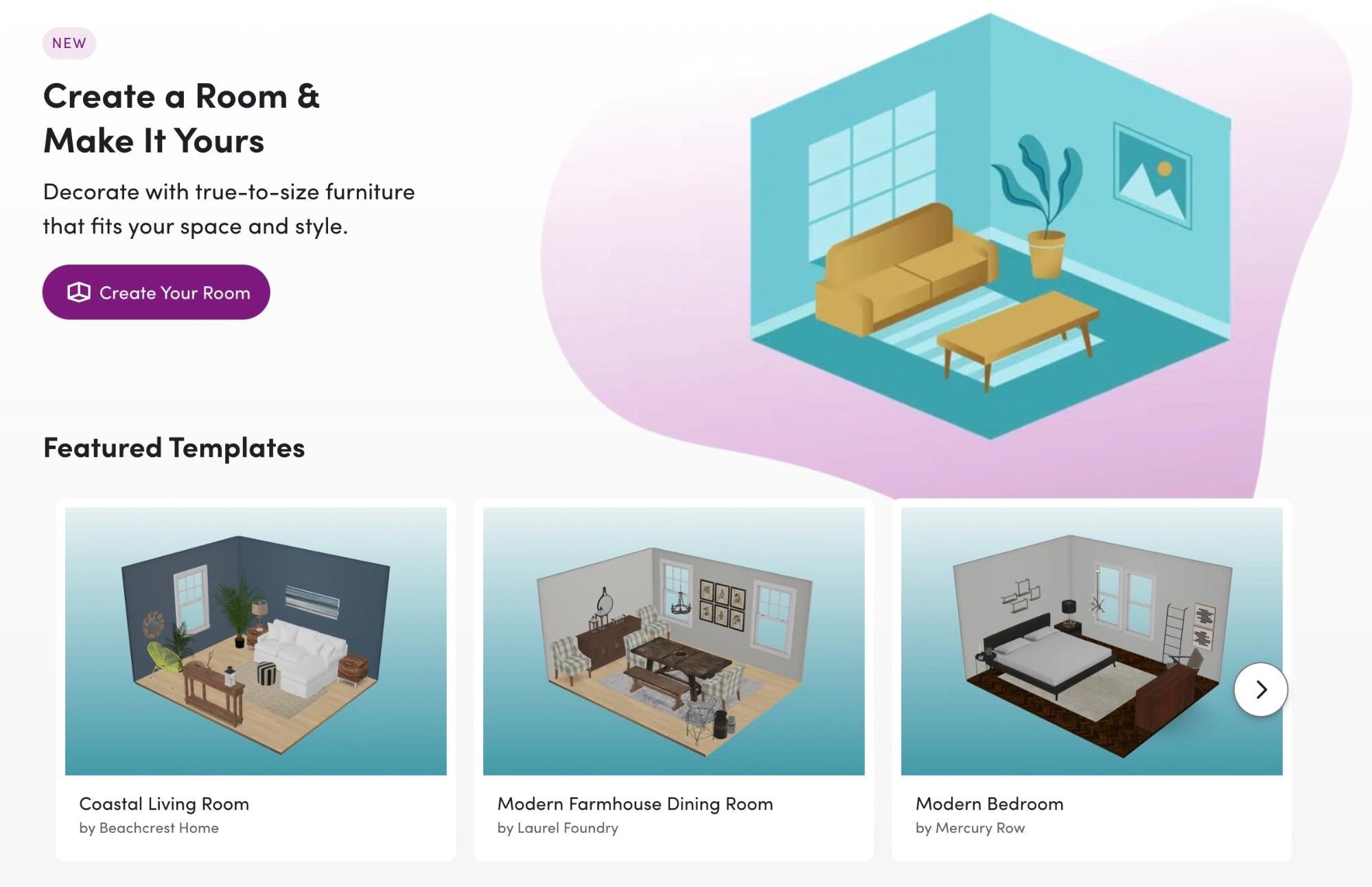Try before you buyis a sales model that lets customers try on or test products in the convenience of their home before completing payment.
It can also take place in-store, in the form of appointment shopping or showrooming, and online via virtual shopping or augmented reality (AR) apps. Depending on the structure of your try-before-you-buy program, customers can send back the items they don’t want, either for free or for a small fee.
Try-before-you-buy services are taking the ecommerce industry by storm, catering to everyone including busy moms, professionals, children, and tweens.
While more brands are experimenting with try-before-you-buy programs, there are a few frontrunners in this space. In this article, we’ll take a look at what you can learn from them, the benefits of try before you buy, and popular trends to consider for your brand.
What is try before you buy?
Try before you buylets customers see and try products before making a purchase. Similar to how shoppers try on or test merchandise in-store, this order fulfillment option usually involves delivering products to the customer so they can try before buying, or scheduling an in-store appointment to do the same.
Examples of try-before-you-buy programs
- Amazon Prime Try Before You Buy
- Wayfair
- Warby Parker
- Gemist
- Stitch Fix
- Casper
- Birchbox
1. Amazon Prime Try Before You Buy
If you’re an Amazon Prime member, you may have heard of Prime Try Before You Buy (formerly Amazon Prime Wardrobe)—the try-before-you-buy service that allows you to try on clothes and accessories at home before deciding whether to purchase them.

How Prime Try Before You Buy works is pretty simple:
- Shop for eligible items on Amazon. Eligible items will be marked with the Prime Try Before You Buy logo.
- Toggle on “Prime Try Before You Buy” before checkout. Then click Buy Now & Try Free.
- Try on the items at home and keep what you love. You’ll have up to seven days to try on the items in the comfort of your own home.
- You’ll only be charged for the items you decide to keep, and you’ll receive a discount on your purchase if you keep three or more items. If you decide to return any unwanted items, simply place them in the return bag (prepaid return label included) and drop it off at a UPS location.
Prime Try Before You Buy also has several features that set it apart from the competition:
- Prime membership:The program is available only to Amazon Prime members, which means you’ll have access to other Prime perks, such as free two-day shipping, streaming of movies and TV shows, and more.
- Prime Personal Shopper:With Prime, you can hire a personal shopper for $4.99 per styling.
- Wide selection:As mentioned earlier, Amazon has a vast selection of clothing and accessories available, from brands like Levi’s and Adidas, making it easier to find what you’re looking for.
2. Wayfair
Home improvement retailer Wayfair has a3D room plannerfeature that lets shoppers use AR to visualize a range of decorations, furniture, and other products in their home.

You can start by creating a floor plan that matches the dimensions of the room you’re decorating, including windows, doors, radiators, and more.
While it’s still important to compare the dimensions of virtual products against a real room, this try-before-you-buy option lets customers see how Wayfair’s furniture and decorative accessories fit into their space in real time, before completing their purchase.
3. Warby Parker
Popular DTC eyewear brand Warby Parker offers aHome Try-On程序来让客户试着五个不同的帧—either regular or sunglasses—for free, over a period of five business days.

Once the try-before-you-buy period is over, customers must return the items they don’t want (using a prepaid return shipping label), and can purchase the item(s) they like.
4. Gemist
Gemist, a jewelry brand that sells customizable, made-to-order rings and earrings, offers aTry-On Experiencethrough its online store to let customers choose three ring styles to try for up to 14 days.

When the customer orders its curated box of try-on rings, they’re charged a $45 deposit that gets refunded in full once the Try-On Box has been returned. If the customer chooses to keep some or all of the rings, they’re charged the full retail price for each.
5. Stitch Fix
Stitch Fixoffers customers a personalized shopping experience using a combination of data science and curated collections picked out by human stylists.

For a $20 styling fee, customers receive five items and can decide whether to keep or return them. If a customer keeps all the items in a shipment, they receive a 25% discount. Customers can subscribe to receive shipments monthly, quarterly, or at a frequency of their choosing.
Stitch Fix uses a unique algorithm, along with hand-picked recommendations from a real stylist, to predict a customer’s style preferences.
The more feedback a customer offers on which types of clothing items they prefer, based on online images where they can select a thumbs up or a thumbs down, the more artificial intelligence learns about their style. Customers can also select a price range for how much they are willing to spend on each item.
This highly customized try-before-you-buy model is what has helped Stitch Fix become so successful. The hand-picked offerings are resonating with an increasing number of customers.
6. Casper
Digitally native mattress brand Casper lets customerstry mattresses for 100 nightsbefore deciding to buy.

There’s also a minimum 30-night trial period to give your body time to adjust to a new mattress. If customers decide after 30 days that the mattress is not for them, Casper picks up the unwanted mattress and provides a full refund, as long as it’s not damaged.
The brand also offers a 30-night trial for other “snooze supplies.” This includes pillows, bedding, glow lights, dog beds, and furniture.
7. Birchbox
With a $15-per-month subscription,Birchboxcustomers receive beauty product samples chosen specifically to match their profile, including skin or hair type.

They can try the products and purchase the full-size version on the Birchbox shop, which offers 500 brands, from MAC and Kiehl’s to up-and-comers like Sunday Riley and OUAI.
Founded in 2010, the company has more than one million subscribers and 2.5 million active customers. Some 35% of revenue comes from sales of full-size samples online, and about 50% of subscription customers shop for full-size products on Birchbox.com, according to thecompany’s fact sheet. The company also has retail stores in NYC and Paris.
Benefits of try before you buy
Differentiate your brand and products
Offering a try before you buy can give you a competitive advantage over retailers that don’t.
For fine jewelry brand Gemist, try before you buy helped differentiate its brand by letting consumers try on fashion replicas of their ring designs, resulting in a fine jewelry purchase (often an engagement purchase) of that design.
"We always learn and listen to our consumers, and when we launched this experience many of them were interested in also purchasing the try-on replica—what we call a “stand-in ring”—for things like travel, the beach, and working out, saysMenaka Sampath, Marketing Director atGemist.
"Now we have an additional revenue stream from this feature that we didn’t originally anticipate. That’s the beauty of trying something new: you never know what other benefits will come from it."
Reach and attract new markets
Letting customers try products before they buy can help alleviate any second thoughts they’re having about purchasing from a new business or ordering products they’re not familiar with.
And try before you buy is a great way to attract consumers who are generally apprehensive about online shopping. The fact that they don’t need to pay unless they’re satisfied with their order can make people feel more comfortable and confident about buying your products online.
Build trust, customer satisfaction, and loyalty
Not only does try before you buy help attract new customers, it gives your existing customer base more flexibility and convenience to try new products, something 57% of consumers say influences their decision to buy online, according toa commissioned Forrester Consulting study代表Shopify进行。
The same study shows that 45% of brands say they’re investing in improving the flexibility of their shipping and return policies. Doing this can boost trust in your business, encourage customers to continue buying from you, and have those customers likely tell their friends and family about the benefits of your try-before-you-buy policy.
Boost brand awareness
Try before you buy is a great way to offer a smooth and convenient shopping experience that encourages customers to return, as well as spread the word about your business. It’s also a great way to get more products into the hands of customers.
Whether they buy immediately or not, offering an easy way to try products without commitment can help move first-time customers through the buying journey.
Increase sales
Consumers today are inundated with choices, making shopping online more of a chore than retail therapy. But try before you buy makes it easier for customers to compare options in person, attracting an audience of people who prefer to touch and try products before they pay—and they can do it from the convenience of their home.
According toa commissioned Forrester Consulting studyconducted on behalf of Shopify, 65% of shoppers say the ability to compare similar products is very valuable to them when searching or buying products online. Meeting shoppers where they are is key to increasing sales.
“The best thing about home Try-On, especially for a luxury product like fine jewelry, is that it takes the risk out of the purchase,” says Sampath.
“Our Try-On customer usually has an AOV three times higher than customers who go directly to customizing and buying online without participating in our Try-On Experience. For us, it has been a fantastic way to innovate within the fine jewelry space and bring the romance of brick-and-mortar to the consumer. We have seen great growth across the board with this unique experience,” Sampath adds.
Reduce return rates
It may sound counterintuitive, but letting shoppers try products before they buy can help reduce your orderreturn rates. Why? If customers get to touch and try products before they actually pay, the likelihood of returns due to fit issues or the item being different than what they expected will decrease.
专家提示:View theProduct orders and returns reportin Shopify admin to see the return rates of your top ordered products, top returned products, and products with the highest return rates, as well as your store’s overall return rates.
Is a try-before-you-buy program right for your business?
In today’s retail landscape, offering try-before-you-buy options can help differentiate your brand from competitors. It can also help you reach a growing audience of consumers looking for flexible and free shipping options. But before you decide if it’s right for your business, it’s important to make sure it’s logistically and financially possible.
Know your customers better with Shopify
Use Shopify’s customer profiles to get a complete view of your customers. Collect contact information, see what they buy online and in-store, how many orders they’ve placed, which channels they prefer, add notes to their profile, and more.

